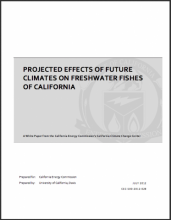Projected Effects of Future Climates on Freshwater Fishes of California

A methodology is presented that allows systematic evaluation of climate change impacts on freshwater fishes in California (121 native fish taxa and 43 aliens). The methodology uses expert opinions of the authors and literature reviews of status and biology of the fishes to score both status of each species (“baseline vulnerability”) and likely impact of climate change (“climate change vulnerability”). Baseline and climate change vulnerability scores were highly correlated with one another and were consistent among different scorers. Native species were found to have both greater baseline and greater climate change vulnerability than alien species. Fifty percent of natives had critical or high baseline vulnerability versus none for aliens; 83 percent had critical or high climate change vulnerability versus 19 percent for aliens. Fishes with high baseline vulnerability were also likely to have highest vulnerability to climate change. These results show that predicted climate change effects on fresh water environments will dramatically change the fish fauna at all scales and at all elevations. The research team concluded that most native fishes will suffer population declines and become more restricted in their distributions; some will likely be driven to extinction, if present trends continue. Fishes requiring cold water (<22°C [72°F]) are particularly likely to go extinct. In contrast, most alien fishes will thrive, with many species likely to increase in abundance and range. However, even many aliens will ultimately be negatively affected through loss of aquatic habitats during severe droughts and stressful conditions in most waterways during summer months. On a regional scale (e.g., San Francisco Bay tributaries), vulnerability patterns follow statewide patterns and indicate the need for conservation strategies adapted to local conditions. Studies of three streams with long‐term data on fish abundance indicate that native and alien species respond in different ways to variability in stream flow, which is likely to become more variable with climate change.
See also this related work: Effects of Climate Change on Inland Fishes of California
Moyle, P. B., J. D. Kiernan, P. K. Crain, and R. M. Quiñones. 2012. Projected Effects of Future Climates on Freshwater Fishes of California. California Energy Commission. Retrieved from http://www.energy.ca.gov/2012publications/CEC-500-2012-028/CEC-500-2012-....
